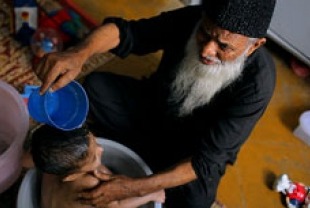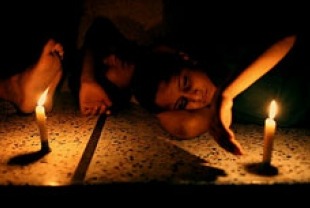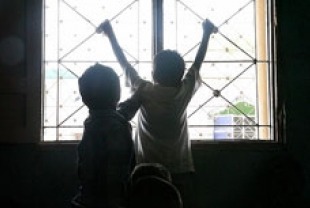Millions of children around the world are living under threat. According to UNICEF (The United Nations Children's Fund), 99 million children under five years of age are underweight, while 162 million children are stunted or chronically undernourished.
In addition, millions of children worldwide, from all socio-economic backgrounds and across all ages, continue to be affected by violence, exploitation, and abuse. Many of these children run away from home and are forced to live on the streets.
These Birds Walk addresses the plight of both groups of children in a chilling and compassionate documentary set in Karachi, Pakistan, a city filled with poor people. Abdul Sattar Edhi has set up the Edhi Foundation, a nonprofit social welfare program which has over 300 centers across the country. It has the largest private ambulance service in the world.
In the opening scenes, directors Omar Mullick and Bassam Tariq introduce us to this elderly humanitarian as he gently washes the undernourished bodies of a group of infants in his foundation's care. There is tenderness in his touch and he conveys real love to these little ones who have nearly died of starvation and now have a home.
Although Edhi has won awards and recognition for his compassion for children in jeopardy, he shuns publicity and tells the film's directors "When I am washing these children I feel closer to God . . . If you want to find me, look among ordinary people." And so instead of talking heads and other regular features of documentaries, we are plunged into the lives of Omar, a strong-willed 10-year-old boy who has run away from home and been picked up on the streets of Karachi. We also meet Asad Ghori, a young ambulance driver who describes his feelings about his unusual job and his encounters with the families of these runaway boys. He understands the kids because he was once one himself.
Omar befriends another runaway at the orphanage, which provides a refuge for these children until their parents pick them up. They feed them, teach them, and lead them in Muslim prayer. When his new friend returns to his family, Omar starts acting out his fear, frustration, and anger by bullying other boys. His outward violence is an expression of his inward confusion about whether to stay at the orphanage, to run away, to return home, or to commit suicide.
Asad Ghori is kept busy in his van delivering corpses here and there as well as taking runaway boys home to their parents. Sometimes, he feels very good about the spiritual nature of his work and he looks up to Edhi as his mentor. On other days, he is depressed and saddened when he has to let go of children who are abused or hated by their parents. One uncle says: "He would have been more use to us if you brought back his corpse."
At the end of These Birds Walk you might want to send love and compassion to these children:
May all children be free of suffering.
May all children be well.
May all children live with ease, assured of the necessities of life.
May all children know peace and joy."


